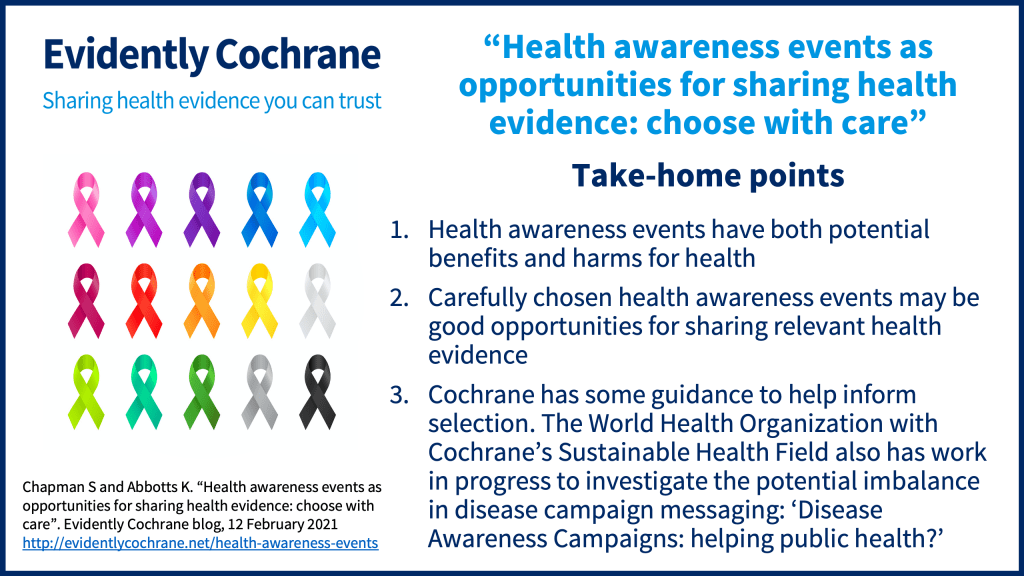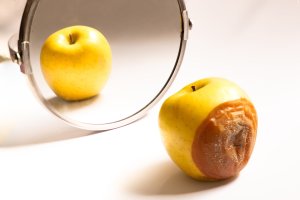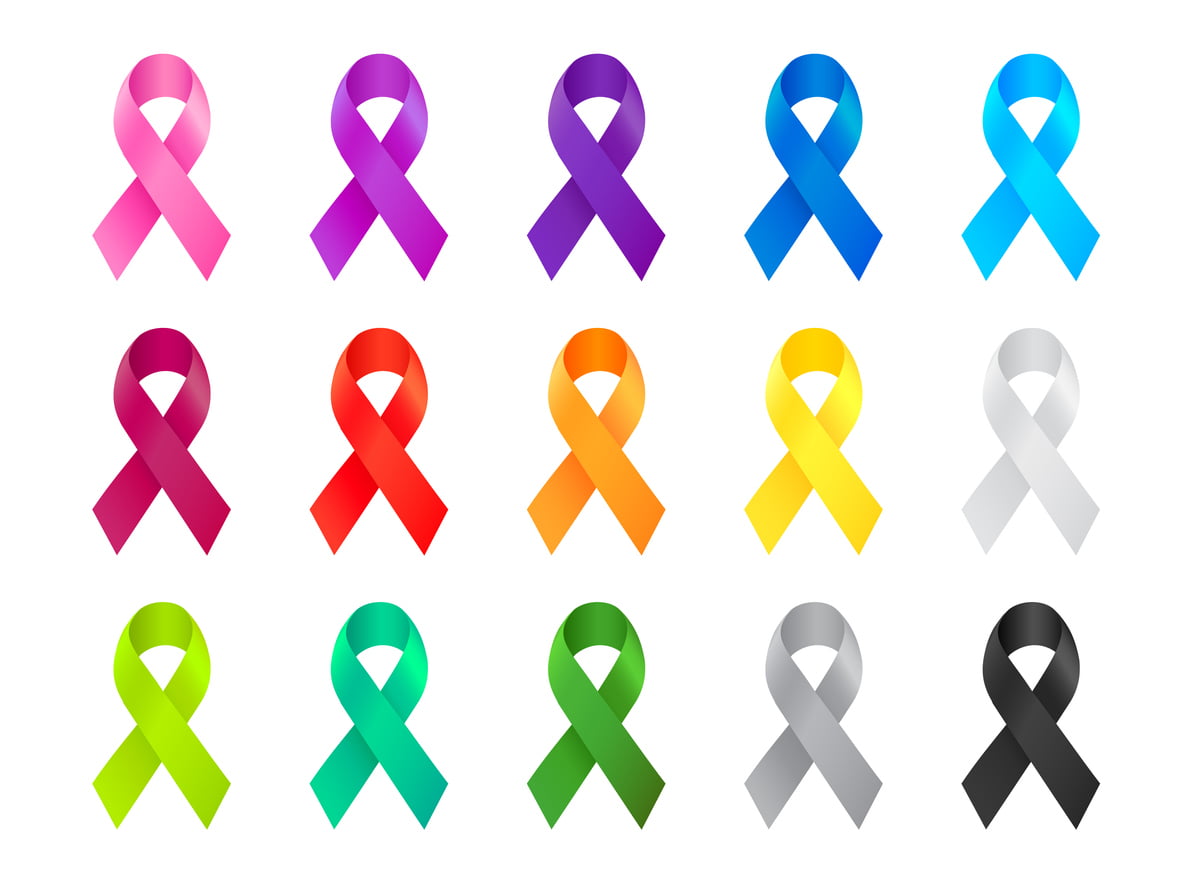In this blog for those interested in sharing health evidence, Cochrane UK Knowledge Broker Sarah Chapman talks with Katie Abbotts from Cochrane’s Knowledge Translation Department about the pros and cons of health awareness events and how to choose and use them wisely.
Page last checked 29 June 2023

From Dry January to Heart Month, Mental Health Week and you-name-it Days – there is a constant stream of awareness events for just about any health condition or topic you can think of. On the one hand, they are opportunities to shine a spotlight on diseases or health behaviours, and share relevant health information and resources that could lead to improved health outcomes. They can challenge stigma, bust myths, raise funds, campaign for change and more. On the other, they may spread inaccurate, unbalanced or harmful messages. Some have been criticised for being guided by over-simplified theories of health promotion, for stoking anxiety about health, and for other reasons. For example, there has long been backlash against the involvement of commercial partners in breast cancer awareness month (common to many health awareness events) and against the ‘pink ribbon breast cancer culture’ which, it has been argued, replaces genuine awareness with visibility and tends to oversimplify the disease, its detection and its treatment as well as creating a commercial opportunity for brands to make money through associated fundraising.
A decade ago, when Cochrane UK expanded its use of social media and then later started our blog, we recognised awareness events as opportunities to bring new audiences to Cochrane through sharing relevant evidence. Whilst the use of awareness events can help boost evidence dissemination, as Elena Kostova, Managing Editor of Cochrane Gynaecology and Fertility, has discussed in her blog on using awareness days to promote Cochrane evidence, we haven’t always found this a successful approach. The content we prepared and shared on social media in 2017 for #WorldAntibioticAwarenessWeek was lost in the deluge of information that went out with that hashtag. We’ve also come to realise that there are complexities around these events that we need to better understand, to guide our use of them as dissemination and engagement opportunities. This is a challenge for Cochrane as a whole, ensuring that awareness events are used wisely to share evidence that may be useful to their audiences, but avoiding pitfalls such as appearing to endorse associated businesses, products or messages.
Katie Abbotts, has been involved in probing further into the issues around awareness events and the implications for Cochrane. Katie and the Knowledge Translation team have developed some guidance, after consultation with the Cochrane Sustainable Healthcare Field, Cochrane’s geographic centres and advocacy lead, for those in Cochrane considering using awareness events to support their work. I talked to her about it.
What prompted this work?
This was my first question to Katie. After all, awareness events go back many years.
Katie: “Cochrane received feedback from Wiser Healthcare explaining overdiagnosis and overtreatment are important and widespread problems in modern health systems, and disease awareness campaigns, unfortunately, can contribute to them by encouraging healthy people to have tests that they don’t need and which may harm them. This piqued my interest. Then in further discussion, I heard of the term astroturfing and how some awareness days may be a product of that practice of creating a false impression of a grassroots movement with widespread support.
It simply appeared to me that awareness days should be used with consideration and thought. I had assumed they were harmless and useful tools for promoting Cochrane evidence but it turns out not all awareness days are the same.”
What questions should we be asking when considering engaging with a health awareness event to share evidence?
Katie: “We’ve created some guidance. This is a one page summary of the guidance, and this is the full document. In essence, I’d ask before making any kind of association: Is the day legitimate? Is it relevant? Who is behind it? Does the awareness day have a strong profile? Do Cochrane Reviews support or contrast with the main messages of the awareness event? Does the awareness day encourage overtreatment, overdiagnosis or wasted health resources?
I had thought, that if the awareness event was on the World Health Organization (WHO) list (see page 3), this would give it credibility, but it turns out the WHO are also looking at awareness events and their value too. You can read more about WHO’s take on World Health Days here. More recently a team, many of whom are linked to Cochrane’s Sustainable Health Field have started to look at this in more depth, and have started a study Disease Awareness Campaigns: helping public health? This will investigate whether the messaging of disease awareness campaigns is imbalanced – placing more emphasis on the benefits of diagnosis, tests and interventions than the harms. I’m looking forward to seeing what the WHO conclude and also the results from this study.

Any final tips?
In simple terms, before picking an awareness day, have a good look at it. Scrutinise it, and ask what value is it adding to healthcare overall? This makes me think of picking fruit at the supermarket. I squeeze it, check where it’s from, ask if it is local, in season, what is it wrapped in, look for bruises, and check if it’s fairly traded. I don’t just go for the shiniest melon or apple. Only then do I decide whether to put it in my basket. I know fruit is good for me per se, but only after I’ve critically assessed it from an environmental, social, financial and cosmetic lens! (Note: this is why I hate shopping, it gives me a headache.)”
Join in the conversation on Twitter with @CochraneUK or leave a comment on the blog.
Please note, we cannot give medical advice and we will not publish comments that link to individual pages requesting donations or to commercial sites, or appear to endorse commercial products. We welcome diverse views and encourage discussion. However we ask that comments are respectful and reserve the right to not publish comments we consider offensive.
Sarah Chapman and Katie Abbotts have nothing to disclose.


